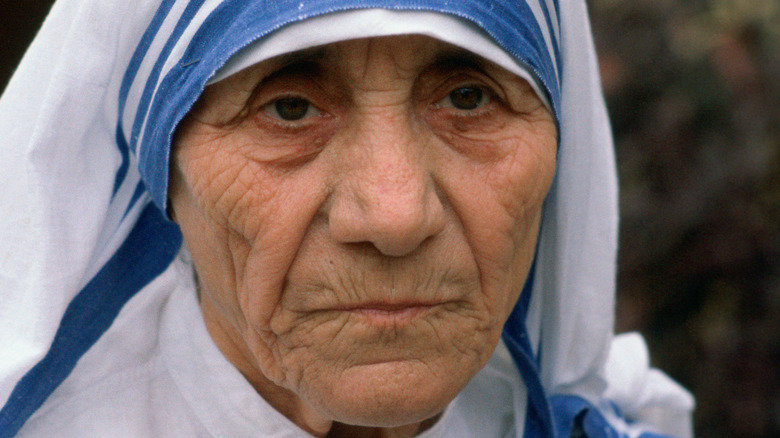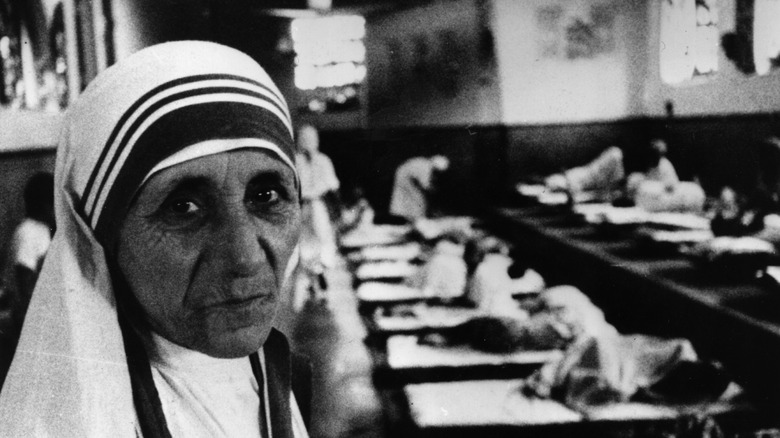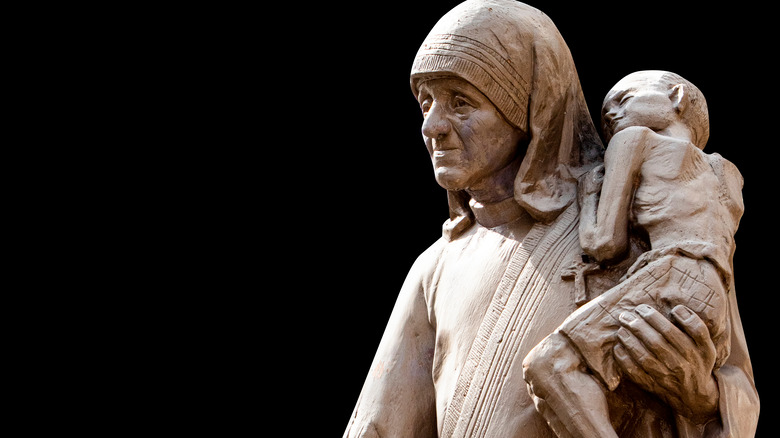A Prominent Donor For Mother Teresa Was Convicted Of Investment Fraud
Mother Teresa is one of the most famous women of all time. Her name has become synonymous with piety and generosity, a known humanitarian who worked in India (via Biography). Having grown up in a religious household, she decided to join a Catholic order of women teachers at the age of 18, and not long after was sent to India, where she taught for many years. When she was 36 years old, she felt she received a message from Jesus Christ, which inspired her to work with poor people in the Indian city of Calcutta, ensuring that they had educational opportunities and the medical care they needed. Mother Teresa's organization quickly attracted donations and grew rapidly, and by the late 1990s it was working in over 100 countries.
Still, while Mother Teresa's work may seem uncontroversial — who could argue with providing care to the poorest people in society? — in fact, she's a more complicated figure than she may initially appear. When Mother Teresa was declared a saint of the Catholic Church in 2016 (via The New York Times), a debate was sparked over her worthiness for the honor. Some people argued that she was undeserving, in part because of a variety of scandals which had followed her over her life (via The New York Times), including her association with Charles Keating, a businessman who was a prominent donor to Mother Teresa's charity (via National Geographic).
Who was Charles Keating?
Charles Keating was a businessman who came to be known for scandal (via The New York Times). As a young man, Keating joined the Navy during World War II, and later he went on to attend law school and create his own law firm. Then he went on to work at an insurance company (via Britannica).
But this career move signaled the beginning of Keating's descent into disreputable business practices. Seven years after Keating stepped into his role at the company, he was fined by the SEC for defrauding investors, and 10 years after that, Keating was again implicated in a fraud scheme at his newest company, Lincoln Savings & Loan. Keating, the owner of Lincoln Savings & Loan, was caught committing accounting fraud, failing to report major losses, and falsifying assets (via The New York Times). He was also discovered to have invested more of his clients' money into junk bonds than was legal. Arrested and charged, Keating ended up serving less than five years in prison before he was released after appeals in 1996.
But Keating wasn't the only one to go down for his actions. His involvement with certain senators, from whom he solicited favors in exchange for campaign donations, also eventually led to the end of their careers. And his association with Mother Teresa taints her name even decades later.
How Keating was involved with Mother Teresa
By the 1980s and 1990s, Mother Teresa's reach had grown considerably and her reputation was well-established (via Biography). With donations pouring in from all sides, the fact that Charles Keating gave a whopping $1 million to Mother Teresa may not itself be shocking (via National Geographic). However, when Keating's fraud scandals later came to light, Mother Teresa reportedly attempted to use her influence to help reduce Keating's sentence, writing a letter in his favor to the court. Because Mother Teresa did not disclose that she had received money from Keating, the letter can appear to some to be biased and unfair.
It's interesting to note that Mother Teresa's relationship with Keating is not the only potential skeleton in her closet. The nun and lifelong humanitarian has been accused of offering substandard care to patients in her hospitals, according to National Geographic. Even years after her death, volunteers claim that the hospitals owned by her charity are dirty and poorly run, according to CNN. Questions have also been raised about where and how the organization spends its rather sizable funds.
Still, others have argued that Mother Teresa was ultimately a good person, if flawed. In a debate on the topic of whether Mother Teresa deserved sainthood, one expert on her wrote, "Mother Teresa admitted that what she ... [was] doing was but 'a drop in the ocean' of human misery. But still they were doing something" (via The New York Times).


